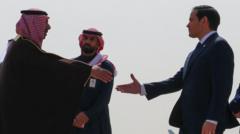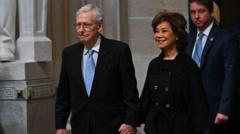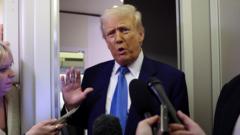This article examines Saudi Arabia's shift from diplomatic pariah to key player in global discussions, particularly in light of its relations with the U.S. and growing ambitions in international politics.
**Trump Talks on Ukraine: Saudi Arabia's Diplomatic Transformation**

**Trump Talks on Ukraine: Saudi Arabia's Diplomatic Transformation**
The selection of Saudi Arabia for Trump's Ukraine discussions highlights the Kingdom's evolving international stature after past controversies.
Saudi Arabia’s recent selection as the venue for discussions surrounding Ukraine by the Trump administration signals a significant shift in its international standing, especially following the fallout from the murder of journalist Jamal Khashoggi in 2018, which had severely tarnished its image. Crown Prince Mohammed bin Salman, previously viewed with skepticism, now finds Saudi Arabia emerging as a crucial diplomatic player, despite ongoing human rights concerns that occasionally surface in global discourse.
Over recent years, Saudi Arabia has invested heavily in various sectors, particularly entertainment and sports, seeking to position itself prominently on the world stage. This drive for recognition has been coupled with a strategic adjustment in foreign relations, particularly during President Biden’s tenure. The Kingdom has appeared to pivot away from its long-standing reliance on the United States, actively forging relationships with nations often seen as rivals to U.S. interests, notably Russia and China.
The anticipated return of Donald Trump to the presidency is viewed positively by Saudi leaders, who benefited from his administration's approach. Trump’s initial foreign visit was to Saudi Arabia, and the practical, business-oriented framework of his foreign policy resonates with the current Saudi leadership. A major objective for Trump in his next term would likely be to broker a peace deal between Saudi Arabia and Israel, thereby building on the groundwork laid by the Abraham Accords initiated during his first term.
However, the ongoing conflict in Gaza poses significant challenges to this ambition, potentially inflating Saudi Arabia's demands for any peace agreement. The Kingdom swiftly dismissed Trump's controversial Gaza proposal that entailed displacing all Palestinians to establish a resort. Instead, it is working with other Arab nations to formulate a viable alternative that aims to preserve the Gazan population while rebuilding the enclave, promoting a two-state solution to the conflict.
Differences in policy stemming from U.S. perspectives on Gaza and the West Bank are likely to create tension in the Saudi-U.S. dynamic moving forward. Nonetheless, it remains evident that Saudi Arabia is intent on solidifying its role as a pivotal figure in global diplomacy, even as it navigates complex geopolitical landscapes.
Over recent years, Saudi Arabia has invested heavily in various sectors, particularly entertainment and sports, seeking to position itself prominently on the world stage. This drive for recognition has been coupled with a strategic adjustment in foreign relations, particularly during President Biden’s tenure. The Kingdom has appeared to pivot away from its long-standing reliance on the United States, actively forging relationships with nations often seen as rivals to U.S. interests, notably Russia and China.
The anticipated return of Donald Trump to the presidency is viewed positively by Saudi leaders, who benefited from his administration's approach. Trump’s initial foreign visit was to Saudi Arabia, and the practical, business-oriented framework of his foreign policy resonates with the current Saudi leadership. A major objective for Trump in his next term would likely be to broker a peace deal between Saudi Arabia and Israel, thereby building on the groundwork laid by the Abraham Accords initiated during his first term.
However, the ongoing conflict in Gaza poses significant challenges to this ambition, potentially inflating Saudi Arabia's demands for any peace agreement. The Kingdom swiftly dismissed Trump's controversial Gaza proposal that entailed displacing all Palestinians to establish a resort. Instead, it is working with other Arab nations to formulate a viable alternative that aims to preserve the Gazan population while rebuilding the enclave, promoting a two-state solution to the conflict.
Differences in policy stemming from U.S. perspectives on Gaza and the West Bank are likely to create tension in the Saudi-U.S. dynamic moving forward. Nonetheless, it remains evident that Saudi Arabia is intent on solidifying its role as a pivotal figure in global diplomacy, even as it navigates complex geopolitical landscapes.





















